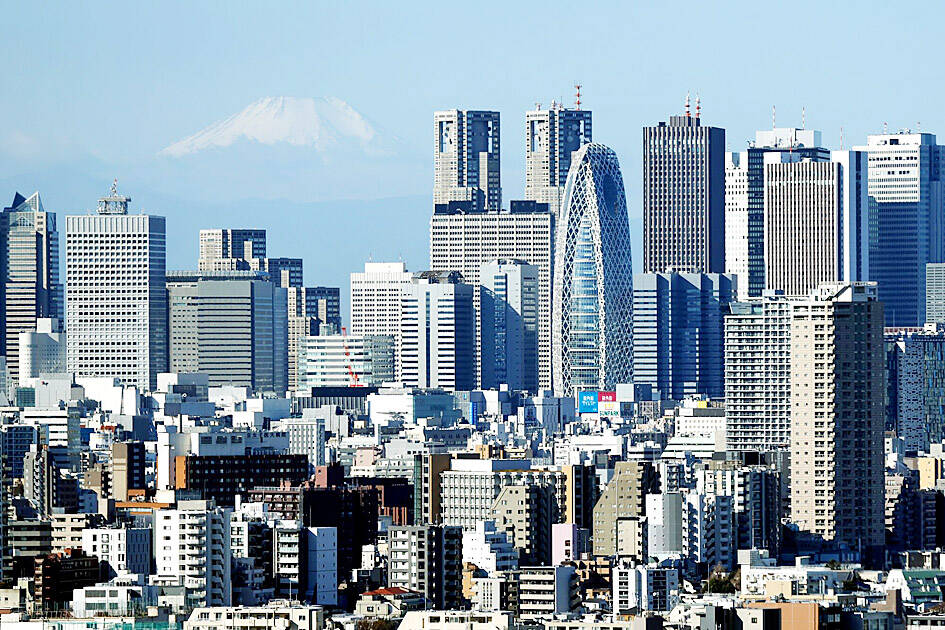Japan lost its position as the world’s largest creditor nation for the first time in 34 years, despite posting a record amount of overseas assets.
Japan’s net external assets reached ¥533.05 trillion (US$3.7 trillion) at the end of last year, rising about 13 percent from the previous year, data released yesterday by the Japanese Ministry of Finance showed.
Although the figure marked an all-time high, it was overtaken by Germany, whose net external assets totaled ¥569.7 trillion. China stayed in third place, with net assets of ¥516.3 trillion. Japan began its streak at the top by overtaking Germany in 1991.

Photo: Bloomberg
Germany’s ascent reflects its substantial current account surplus, which reached 248.7 billion euros (US$282.2 billion) last year, largely due to a strong trade performance.
Japan’s surplus in turn was ¥29.4 trillion, according to the finance ministry, equivalent to about 180 billion euros.
Last year, the euro-yen rate rose around 5 percent, exaggerating the increase in German assets versus Japanese assets in yen terms.
Japan’s status as the world’s biggest net-creditor nation was a consequence of decades of current account surpluses that saw Japanese investors and companies load up on holdings abroad. Losing the title suggests that while Japan’s assets continue to rise, real demand has been stronger in other nations, including Germany and China.
A country’s net foreign assets are the value of its overseas assets minus the value of its domestic assets that are owned by foreigners, adjusted for changes in currency values, and the figure is essentially reflected in the cumulative change of the country’s current account.
Japanese Minister of Finance Katsunobu Kato yesterday signaled that he was unperturbed by the development.
“Given that Japan’s net external assets have also been steadily increasing, the ranking alone should not be taken as a sign that Japan’s position has changed significantly,” Kato told reporters.
For Japan, a weaker yen contributed to increases in foreign assets and liabilities. However, assets grew at a faster pace, driven in part by expanded overseas business investment.
Yesterday’s data generally reflect broader trends in foreign direct investment.
Last year, Japanese companies maintained a robust appetite for foreign direct investment, particularly in the US and UK, the ministry said.
Sectors such as finance, insurance and retail attracted significant capital from Japanese investors, it said.
Looking ahead, the trajectory of outbound investment might hinge on whether Japanese firms continue to expand their overseas spending, especially in the US. With US President Donald Trump’s tariff policies in effect, some companies might be incentivized to relocate production or transfer assets to the US to mitigate trade-related risks.

DIVIDED VIEWS: Although the Fed agreed on holding rates steady, some officials see no rate cuts for this year, while 10 policymakers foresee two or more cuts There are a lot of unknowns about the outlook for the economy and interest rates, but US Federal Reserve Chair Jerome Powell signaled at least one thing seems certain: Higher prices are coming. Fed policymakers voted unanimously to hold interest rates steady at a range of 4.25 percent to 4.50 percent for a fourth straight meeting on Wednesday, as they await clarity on whether tariffs would leave a one-time or more lasting mark on inflation. Powell said it is still unclear how much of the bill would fall on the shoulders of consumers, but he expects to learn more about tariffs

NOT JUSTIFIED: The bank’s governor said there would only be a rate cut if inflation falls below 1.5% and economic conditions deteriorate, which have not been detected The central bank yesterday kept its key interest rates unchanged for a fifth consecutive quarter, aligning with market expectations, while slightly lowering its inflation outlook amid signs of cooling price pressures. The move came after the US Federal Reserve held rates steady overnight, despite pressure from US President Donald Trump to cut borrowing costs. Central bank board members unanimously voted to maintain the discount rate at 2 percent, the secured loan rate at 2.375 percent and the overnight lending rate at 4.25 percent. “We consider the policy decision appropriate, although it suggests tightening leaning after factoring in slackening inflation and stable GDP growth,”

Meta Platforms Inc offered US$100 million bonuses to OpenAI employees in an unsuccessful bid to poach the ChatGPT maker’s talent and strengthen its own generative artificial intelligence (AI) teams, OpenAI CEO Sam Altman has said. Facebook’s parent company — a competitor of OpenAI — also offered “giant” annual salaries exceeding US$100 million to OpenAI staffers, Altman said in an interview on the Uncapped with Jack Altman podcast released on Tuesday. “It is crazy,” Sam Altman told his brother Jack in the interview. “I’m really happy that at least so far none of our best people have decided to take them

As they zigzagged from one machine to another in the searing African sun, the workers were covered in black soot. However, the charcoal they were making is known as “green,” and backers hope it can save impoverished Chad from rampant deforestation. Chad, a vast, landlocked country of 19 million people perched at the crossroads of north and central Africa, is steadily turning to desert. It has lost more than 90 percent of its forest cover since the 1970s, hit by climate change and overexploitation of trees for household uses such as cooking, officials say. “Green charcoal” aims to protect what